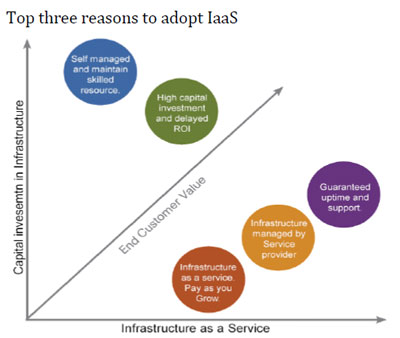IaAS - Infrastructure as a Service
Why IaAs?
Today, many are making the choice to move to some form of infrastructure as a service (IaaS)
for help in managing computing resources. In a 2012 study, Enterprise Strategy Group found
that 30 percent of enterprises (defined as organizations with 1,000 or more employees)
currently use some form of IaaS, compared to 19 percent in 2011.

The study also found that an additional 55 percent are considering or plan to use IaaS in the
future, compared to 44 percent in 2011. The top four reasons for moving to IaaS include its
availability as a resource for testing and development, the ability to run production
applications, the availability of additional resources to accommodate spikes in workload
demands, and for use as a temporary compute resource for time-limited projects.
IaaS’ other key benefits include improved cash flow, accommodation of widely inaccurate
provision planning, and exceptional transparency in utilization and costs
Traditionally, companies met their growing IT needs by investing in more capital equipment.
Today, competitive pressures continue to demand improvements in quality of service despite
growing numbers of users and applications. At the same time, the challenging economic
environment has increased pressure on IT departments to keep costs down.
Introducing Pay-as-you-go model which allows you to scale up or down when ever needed.
At its core, infrastructure as a service is a way for organizations to get the hardware, storage, networking and other services they need to run their operations without worrying about buying, managing or maintaining the equipment. With this model, enterprises “rent” the equipment, paying only for the infrastructure they use. Service provider owns, manages and maintains the equipment, providing enough capacity to scale up or down to meet the needs of its customer organizations.
Key Benifits of IaAs

With no up-front commitments and a payper-use consumption model, IaaS offers an improved start-up cash flow in comparison to conventional data center and IT service models.
The elasticity of IaaS enables customers to rapidly scale up resources as needed even avoiding the undesirable consequences resulting from over and under-provisioning.
The visibility and control IaaS offers over resources, activity and costs, represent a new level of IT management efficiency.
To determine if transitioning to IaaS really is a strategic move from a cost perspective, calculating TCO is a must. This determination must include costs such as upkeep, salaries of IT personnel and the
time commitment of senior management when planning, building, and managing IT infrastructure.
Economics of IaAs
All enterprises are looking for ways to cut costs, and the IaaS provides an opportunity. The pay-as-you-go model means that organizations never pay for
capacity not used. Plus, there are no more costs for upgrading hardware and other infrastructure, no more service contracts and costs.
Lowering costs is a major driver for adopting the IaaS model. Buying an equivalent amount of computing power (not to mention the expertise to manage
those resources and guarantee uptime) would be prohibitively expensive for many enterprises. Other benefits include flexibility, scalability, greater security,
almost 100 percent uptime and the opportunity for enterprises to shift the IT focus to their core mission or business instead of focusing their resources on IT
infrastructure.